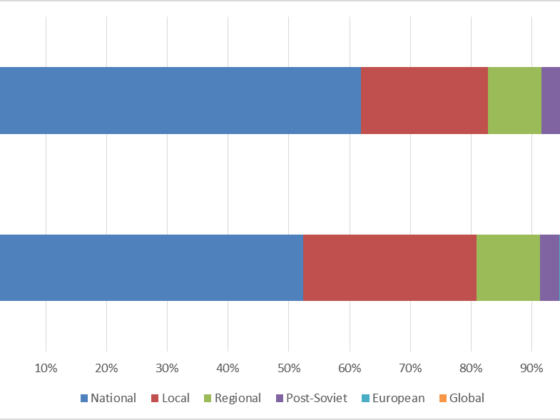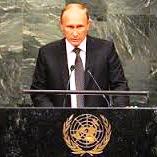One of the most talked about consequences of recent events in Ukraine is a dramatic transformation in Ukrainian national identity. Social activists and various elites regularly assert their increased self-identification as Ukrainians, pride in Ukrainian citizenship, attachment to symbols of nationhood, and readiness to defend and work for Ukraine. Most speak of their own experiences or those of people around them, while others generalize these individual changes to assert a greater consolidation of the Ukrainian nation. They also frequently mention the putative inverse of this consolidation, alienation from and even enmity toward Russia. This is targeted primarily at the Russian state but sometimes also the Russian people, who are believed to overwhelmingly support the Kremlin’s aggressive and undemocratic policies.
To what extent do popular opinions coincide with those of activists and elites? By comparing the results of two nationwide surveys conducted by the Kyiv International Institute of Sociology (KIIS) in February 2012 and September 2014, I examine changes in popular opinion for a period encompassing Ukraine’s Euromaidan protests and the early stage of the war. In addition, focus group discussions held by KIIS in February-March 2015 in different parts of the country reveal the nuances of certain preferences and the motivations behind them.
I analyze change in two main dimensions of Ukrainian national identity, its salience vis-à-vis other social identifications and its content (i.e., the meaning people attach to their perceived belonging to the Ukrainian nation). I find that not only has national identity become more salient but its content has considerably changed, which primarily manifests itself in increased alienation from Russia and a greater embrace of Ukrainian nationalism. At the same time, popular perceptions are by no means uniform across the country, but the main dividing line lies between the Donbas and the rest of the country.
One aspect of the identity content that deserves particular attention has to do with the roles of the Ukrainian and Russian language. While many Russian speakers proudly assert their Ukrainian identity, which they link not to ethnic origin or language practice but to civic belonging, public discourse reveals conflicting opinions about the consequences of this identity choice for language use in society. While Ukrainians largely support the uninhibited use of Russian, they also want the state to promote Ukrainian, which they perceive not only as the language of the state apparatus but also as a national attribute. The failure of the post-Euromaidan leadership to adopt measures to promote the use of Ukrainian is bound to provoke discontent among a large part of society which views the titular language to be an essential element of national identity.










